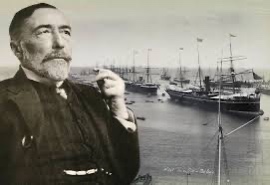This book was chosen before the pandemic and we will be discussing it on zoom next week.
It was mentioned that this may not be a good book to be reading at this time, but this group of readers is committed and that plan was made before 2020 even started.
Actually it wasn't really difficult to read this novel although it is 'dark'. The whole story has an atmosphere of 'darkness'.
A fictional Marlowe, had always wanted to be a captain on a steamer. Through connections in London, he was able to accomplish this.
When Marlowe acquired this job, he was working for a company. He felt that something was not quite right, but did not understand the whole story. He just followed his orders.
In fact, he was part of an organization that set up stations in the Congo, manipulating the natives, and taking huge shipments of ivory.
There was not a lot of violent description, but a dark mood as you read about the way the white men treated the natives. There were coffles of slaves as well as masses of sick and dying natives in the bush. One station had heads on poles as decoration around their hut. The white workers were inhumane and often went mad in the atmosphere of the jungle. Meanwhile, the council in Europe, the main organization, was making huge amounts of money.
The story is simple and sad. The description is beautifully written. "At night sometimes the roll of drums behind the curtain of trees would run up the river and remain sustained faintly, as if hovering in the air high over our heads, till the first break of day".
 |
| Joseph Conrad |
Although it is a fictional story,
it is based on Conrad's experiences in the Congo.





